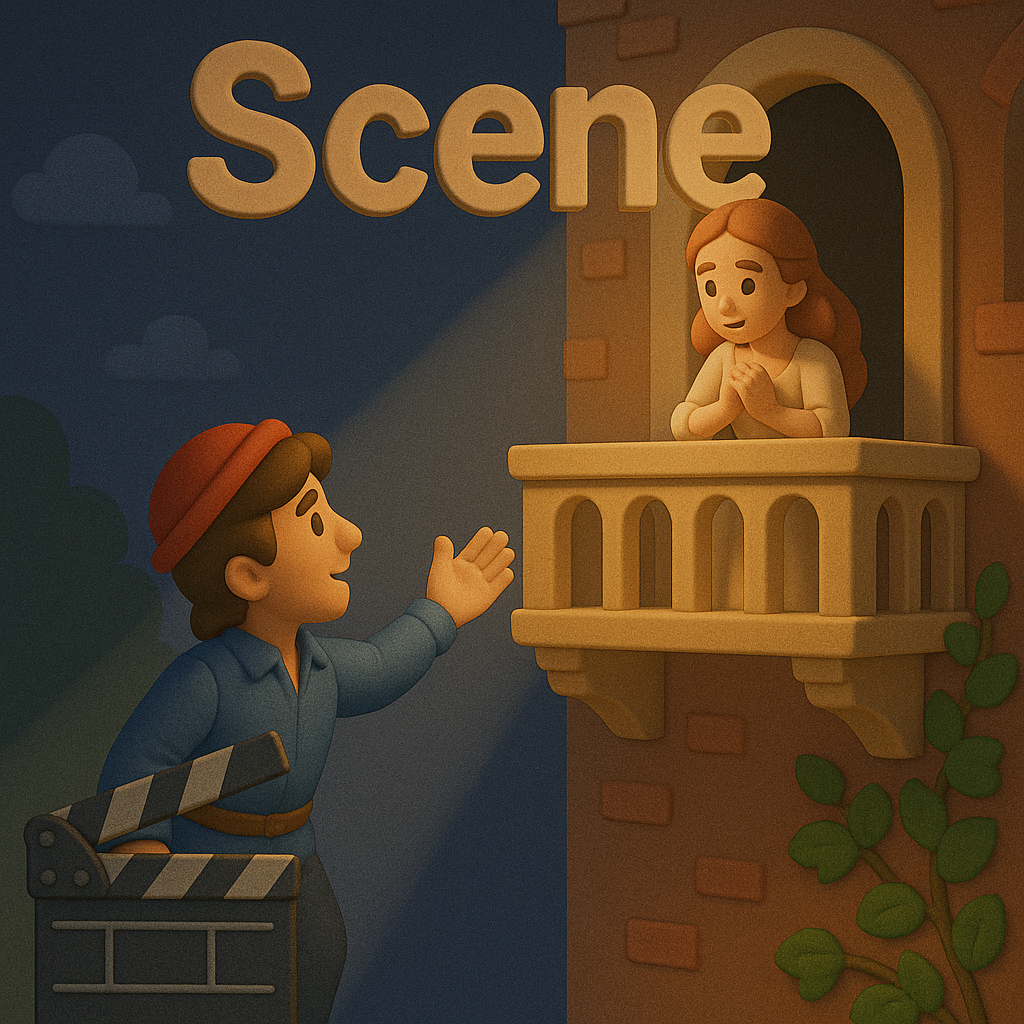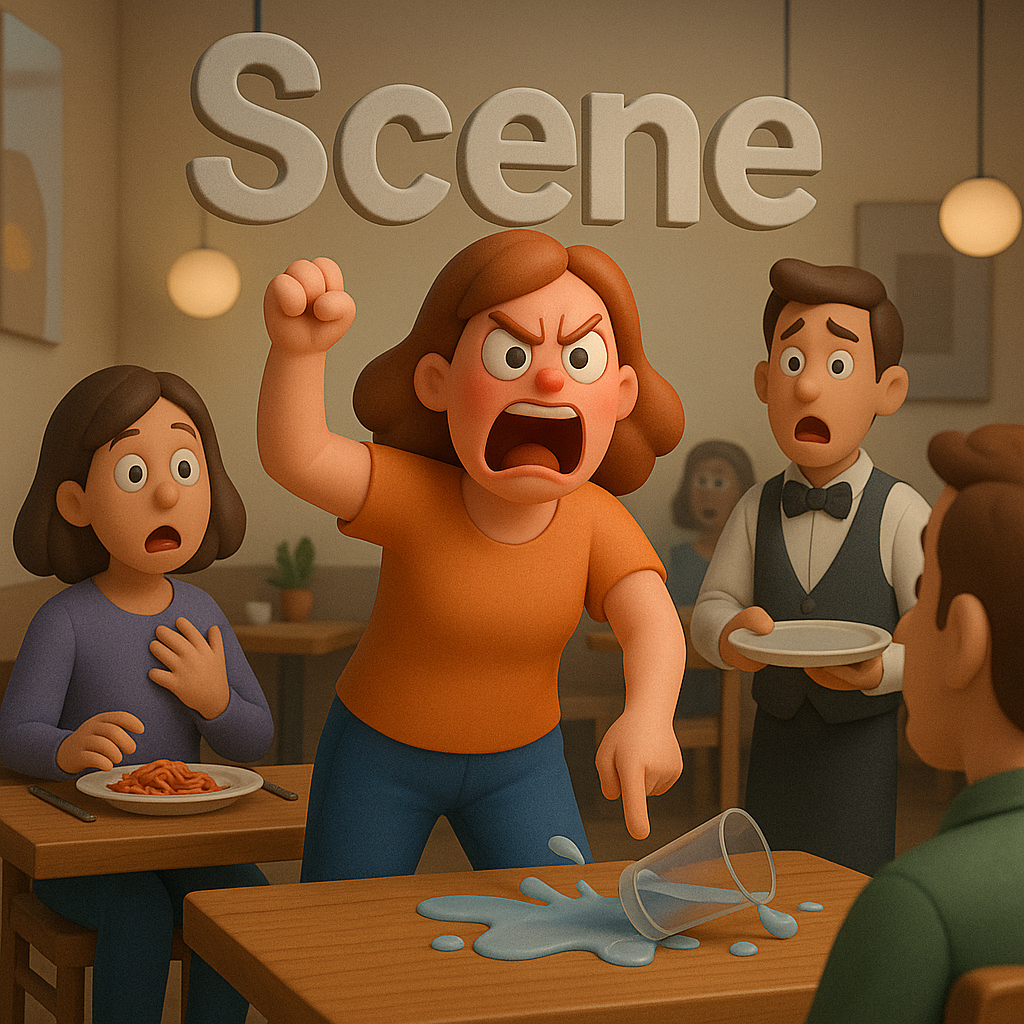Scene
Definition
The term "scene" describes a specific setting, event, or part of a narrative or play, or an area of activity or interest.
Parts of Speech
- Noun
Pronunciation
American English
- IPA Pronunciation: /siːn/
- Respelling: SEEN
British English
- IPA Pronunciation: /siːn/
- Respelling: SEEN
Etymology
The word "scene" originates from the Latin "scaena," meaning "stage" or "theater," derived from the Greek "skēnē," meaning "tent" or "stage building." It was adopted into English through Old French in the late 16th century.
Derivatives
- Scenic (adjective)
- Scenically (adverb)
- Scene-stealer (noun)
- Scenesetter (noun)
- Rescene (verb, rare)
Synonyms
- Setting
- Episode
- Backdrop
Antonyms
- None
Usage
The term "scene" is commonly used in contexts involving storytelling, theater, and visual settings. For example: "The final scene of the movie was breathtaking," or "The crime scene was cordoned off by the police."
Related Terms
- Act: A larger division in a play, often composed of multiple scenes.
- Setting: The location and environment of a narrative or event.
- Backdrop: The background or scenery in a theatrical production.
Detailed Definitions
Noun
- A part of a play, movie, or narrative: Refers to a distinct segment or episode in storytelling or performance.
- Example: "The balcony scene in Romeo and Juliet is iconic."
- A location of an event: Refers to the place where something happens.
- Example: "The rescue team arrived at the accident scene."
- An area of activity or interest: Refers to a specific domain or community.
- Example: "He is well-known in the local music scene."
- A public display of emotion or behavior: Refers to an embarrassing or dramatic act in public.
- Example: "She caused a scene at the restaurant over a minor issue."
scene



🇨🇳 Mandarin
- 场景 (scene as part of a play or movie)
- IPA: /ʈʂhɑŋ˥˥ tɕiŋ˥˥/
- English respelling: changjing
- 景象 (scene as a view or sight)
- IPA: /t͡ɕiŋ˥˥ ɕiɑŋ˥˥/
- English respelling: jingxiang
🇮🇳 Hindi
- दृश्य (scene as part of a play or movie)
- IPA: /d̪ɾʊʃ.jaː/
- English respelling: drishya
- मंजर (scene as a view or sight)
- IPA: /məndʒər/
- English respelling: manjar
🇪🇸 Spanish
- Escena (scene as part of a play or movie)
- IPA: /esˈθena/
- English respelling: escena
- Vista (scene as a view or sight)
- IPA: /ˈvista/
- English respelling: vista
🇫🇷 French
- Scène (scene as part of a play or movie)
- IPA: /sɛn/
- English respelling: scene
- Vue (scene as a view or sight)
- IPA: /vy/
- English respelling: vue
🇸🇦 Arabic (Modern Standard)
- مشهد (scene as part of a play or movie)
- IPA: /ˈmʊʃ.hæd/
- English respelling: mushhad
- منظر (scene as a view or sight)
- IPA: /mʊnˈðʊr/
- English respelling: mundhur
🇧🇩 Bengali
- দৃশ্য (scene as part of a play or movie)
- IPA: /driʃjɔ/
- English respelling: drishyo
- দৃশ্য (scene as a view or sight)
- IPA: /driʃjɔ/
- English respelling: drishyo
🇷🇺 Russian
- Сцена (scene as part of a play or movie)
- IPA: /ˈst͡sɛnə/
- English respelling: stsena
- Вид (scene as a view or sight)
- IPA: /vid/
- English respelling: vid
🇵🇹 Portuguese
- Cena (scene as part of a play or movie)
- IPA: /ˈsɛnɐ/
- English respelling: cena
- Vista (scene as a view or sight)
- IPA: /ˈviʃtɐ/
- English respelling: vista
🇮🇩 Indonesian
- Adegan (scene as part of a play or movie)
- IPA: /adɛgan/
- English respelling: adegan
- Pemandangan (scene as a view or sight)
- IPA: /pəmandangan/
- English respelling: pemandangan
🇩🇪 German
- Szene (scene as part of a play or movie)
- IPA: /ˈt͡seːnə/
- English respelling: szene
- Aussicht (scene as a view or sight)
- IPA: /ˈaʊ̯sɪçt/
- English respelling: aussicht
🇯🇵 Japanese
- シーン (scene as part of a play or movie)
- IPA: /ɕiːn/
- English respelling: shiin
- 風景 (scene as a view or sight)
- IPA: /ɸɯ̟̊ᵝkei̯/
- English respelling: fuukei
🇻🇳 Vietnamese
- Cảnh (scene as part of a play or movie)
- IPA: /kəːŋ˧˧/
- English respelling: canh
- Phong cảnh (scene as a view or sight)
- IPA: /fɔŋ˧˧ kəːŋ˧˧/
- English respelling: phong canh
🇰🇷 Korean
- 장면 (scene as part of a play or movie)
- IPA: /dʑaŋ.mʌn/
- English respelling: jangmun
- 풍경 (scene as a view or sight)
- IPA: /pʰʌŋɡjʌŋ/
- English respelling: punggyeong
🇹🇷 Turkish
- Sahne (scene as part of a play or movie)
- IPA: /saːne/
- English respelling: sahne
- Manzara (scene as a view or sight)
- IPA: /manzaːra/
- English respelling: manzara
🇵🇰 Urdu
- منظر (scene as part of a play or movie)
- IPA: /mʊnˈðʊr/
- English respelling: manzar
- منظر (scene as a view or sight)
- IPA: /mʊnˈðʊr/
- English respelling: manzar





